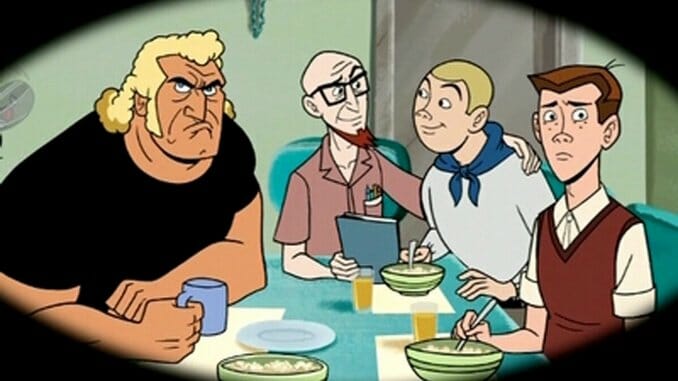The Venture Bros.‘ Legacy is a Prescient Bridge Between Alt-Comedy and Superhero Domination
Images courtesy of Adult Swim
The Monarch is dead, long live The Monarch. Co-creator Jackson Publick (AKA Christopher McCulloch) announced that the slow-produced and beloved series he and Doc Hammer (Eric Hammer) created, The Venture Bros., has been canceled by Adult Swim, stomping out plans for an eighth and final season like so many henchmen’s dreams. It’s a shame to see it end, but the Adult Swim parody goes out as one of the best animated series of all time. Its legacy is one of emotional depth, hilarious alt-comedy, and fluent pop cultural vocabulary that built a prescient bridge between late-night animation and world-dominating cinematic superhero universes.
The story of Hank, Dean, and Rusty Venture (alongside iconic bodyguard Brock Samson) started off as a pulpy Jonny Quest joke and grew into a complex world of calamitous Guilds, occult Triads, and in-universe fandoms. Its meta-humor expanded beyond references to form, giving us a demented Scooby-Doo riff one episode and a standalone story that functioned as the latter half of a surreal two-parter the next. “Escape to the House of Mummies Part I” just doesn’t exist. That kind of joke, one that rewards its audience’s genre fluency and media intellect—prizing sharpness, bitterness, and insight over nostalgia—was The Venture Bros.’ lifeblood running through a tangled nervous system of legacy, failure, and celebrity.
In a world where Z-list supervillains participate in “scared straight” programs and henchmen live with their moms and/or drive their dad’s powder blue Nissan Stanza, The Venture Bros. both predicted the self-referential and self-effacing turn that the world of superheroism would take and provided one of the most nuanced, affecting, and hilarious stories about it. The show’s plots tracked moral side-switching; losses of life, love, and financial security; and the relapse of an ex-pirate captain into tranquilizer addiction. It’s certainly as complicated and melodramatic as the most convoluted multiverse. Its devoted production team kept everything straight and continued to map out inventive, sobering, and consistently funny places for its vast cast of characters to go. Metered out every few years (an eternity in the modern media landscape), The Venture Bros. proved that the best parodies grow beyond their source material. And its growth had a greater industrial impact: just watch its DC-approved spiritual successor, Harley Quinn.
Seven seasons ago (which translates to seventeen years ago in The Venture Bros. time), it’d still be half a decade before Marvel would decide that poking fun at its own legacy was the way to launch its superhero universe. And not just that—its heroes needed to be people. People that understood the ridiculousness of their own ambitions but were still, perhaps reluctantly but earnestly, devoted to them. Iron Man would give fans of the comic world a snarky super-scientist mocking the pomp and circumstance of superhero convention in 2008—a few years after Henchmen 21 and 24 took to the sky as Jet Boy and Jet Girl (though no, there wasn’t really ever a Jet Girl) and Dr. Venture snarked his way through a tag sale of supervillains and shrink rays. Tony Stark was “not the hero type—clearly,” as he put it at his big superhero press conference. Sounds like the Ventures… and everyone they ever ran into.
-

-

-

-

-

-

-

-

-

-

-

-

-

-

-

-

-

-

-

-

-

-

-

-

-

-

-

-

-

-

-

-

-

-

-

-

-

-

-

-








































